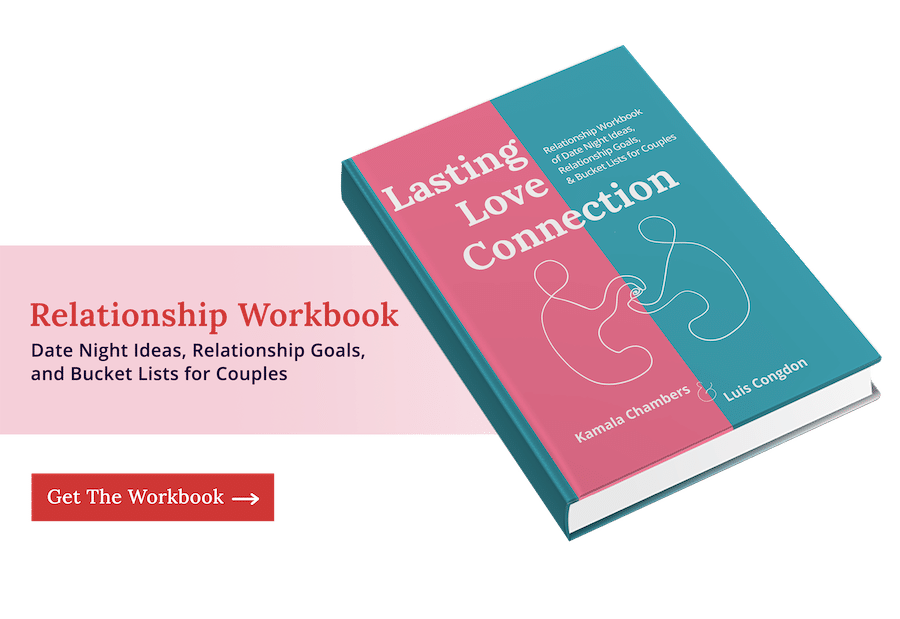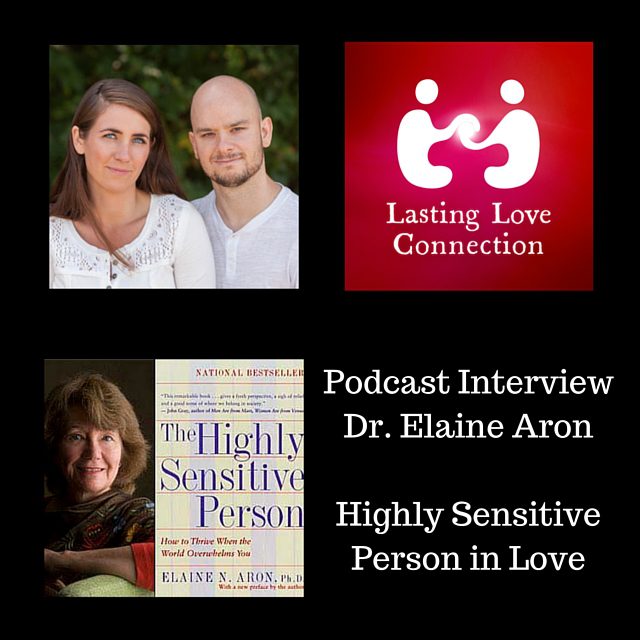Do you easily become overstimulated? Do you sometimes take on other people’s emotions? You may be a Highly Sensitive Person (HSP).
Being highly sensitive doesn’t mean you get your feelings hurt all the time. Highly Sensitive People naturally perceive and take in more from their environment.
In this episode, we interview Dr. Elaine Aron about what being a Highly Sensitive Person means. And how to navigate a relationship as an HSP.
Table of Contents
Related Reading: Highly Sensitive Person Relationship
Key Takeaways
- There are actually about 30% of highly sensitive people who are actually extroverts and not introverts.
- Sensitive people are very sensitive to their environments, including in childhood.
- Sensitive people appear to be more responsive to positive than to negative stimuli.
- D-O-E-S
- Depth of processing is how people prefer to observe and notice subtleties in their environment and process them more deeply before acting.
- Overstimulated people process everything more thoroughly and tend to wear out sooner.
- Emotional responsiveness shows that sensitive people respond more to emotional stimuli than neutral stimuli and more to positive than negative stimuli.
- Highly Sensitive People are also sensitive to stimuli.
- Relationships have to undergo some adjustment for about six months, and then they’re able to let it calm down and integrate better.
- Other issues arise if a sensitive person feels their partner is not sensitive. So both have to grieve the fact that they’re never going to get certain things from their partner.
- You have to be really careful about using your sensitivity as too sensitive.
- The one amazing gift of being highly sensitive is being mindful and monitoring yourself, your environment, and how things affect you and your partner.
- “Volume” refers to how loud you say things and how emphatically and quickly you say them.
- Think of volume in terms of the emotional push behind it and get that volume right. Sensitive people may give out high volume, but they can’t take high volume.
- There are just as many men as women who are born highly sensitive.
- Communication is imperative because conflicts between sensitive and non-sensitive partners are often caused by misunderstandings. Once you communicate, that does not have to be the case.
- We can make good use of each other’s differences without feeling bad about them, either in ourselves or in the other person.
Transcript: Highly Sensitive Person in Love – Dr. Elaine Aron Interview

Kamala Chambers
We are here on The Lasting We are here on the Lasting Love Connection podcast with Doctor Elaine Aron. She’s a clinical research psychologist. She’s the author of 5 books on high sensitivity. We’re so thrilled to have you on the Lasting Love Connection podcast, Dr. Aron.
Dr. Elaine Aron
I’m delighted to be with you.
Luis Congdon
Now, one of the things that really excites me about having you on the show is your research and work on people, individuals, and relationships, specifically on the topic of being highly sensitive—the acronym HSP.
I found your work interesting because, as someone from a strong spiritual background, I hear that term being thrown around loosely without much bonafide evidence or research or something to ground it. so we can say, “Hey, here is what HSP is. Here’s what it means. Here are some of the identifiers.”
I’d love to start by having you talk a little bit about your research and then tell us a little bit about how we know if we are highly sensitive. But first, let’s definitely start with some of your research.
Dr. Elaine Aron
Fine. Yes. It’s interesting that I was researching love and close relationships with my husband, and he and I are both very experimentally rigorous. Someone then commented that I was highly sensitive, and I didn’t know what that meant.
So, the first thing I did was 40 interviews with people who said that they thought they were highly sensitive. From that, I came up with about 65 items that seemed to describe them. My husband ran off with them and did a very multifaceted study with probably over 1000 subjects in different places in the country.
We came up with a 27-item measure of high sensitivity, which we then used for more research. And so it was sort of driven in that way, working with adults. Temperament has been studied a lot in animals and a whole lot in children. It’s difficult to study it in adults because, of course, we have all this other history that comes along with us, all of our experiences.
So, how do you separate temperament from the larger personality with all of its history? But I really believe that if children are born with temperaments, those temperaments are gonna show up in adulthood, too. So what you can do with adults is ask some questions that you can’t ask children, and you can also do brain studies, which you cannot do with children because they move around too much in a scan. Yeah. So people’s, you know, most of the research was on temperament in children, so I was kinda taking off in a new direction.
But sure enough, about 20% of people were highly sensitive, and it’s not the same as extroversion. We found that about 30% of highly sensitive people are extroverts and not introverts. It doesn’t correlate very well with introversion at all.
It looks like it’s related to neuroticism, which is partly the scale’s fault, as it has too many negative items, but I didn’t realize that at the time. It’s also because sensitive people are very sensitive to their environments, including in childhood.
So, if you’ve had a bad childhood or bad childhood environment, a lot of trouble at school or at home, then you are more prone to depression or anxiety than other people. But if you’ve had a good, supportive childhood, supportive at home and at school, then you’re less likely to be depressed or anxious than other people and maybe function even better than other people. So, this is the problem with any study of sensitivities.
You kind of have to pull out that difficulty. You know, we don’t want to associate sensitivity wrongly. Scientifically associate sensitivity with neuroticism or depression and anxiety when they don’t actually belong together if you see what I mean.
HSP Trait: Depth of Processing

Kamala Chambers
It’s such an interesting point because I would think that high sensitivity happens from not having a good childhood or having to be hyperaware of your environment if you have an alcoholic as a parent or something like that. It’s really interesting to hear that it’s a broader range than that. I’d love to hear what some of the traits of highly sensitive people are.
Dr. Elaine Aron
Well, to be clear, and I probably wasn’t at the beginning, this is considered an innate, more or less inborn trait. It’s possible that things around birth, right after birth, or in the womb might affect it. But for the most part, it is innate.
And the hypervigilance that comes with something traumatic in one’s life, including post-traumatic stress syndrome, is things around specific stressors. But this is broad, and it’s typically as reactive to positive as to negative. In fact, getting into the traits, one of the things about sensitive people is that we’re finding now that they appear to be more responsive to positive than to negative stimuli.
This is unusual because human beings are oriented to the negative simply because that helps us with our survival. So I talk about it now because I didn’t until about 2012. With an acronym, D-O-E-S or does, which just helps me remember and helps other people remember.
The “d” stands for depth of processing. I think the most important part of this is that humans and animals with this trait prefer to observe and notice subtleties in their environment and process those more deeply before they act. And an experience for them leaves more, you might say, residue in the brain. There are more experiences. And it’s not so much that their senses are keener. It’s that they’re processing it more deeply.
So, this depth of processing is hard to observe because it’s the least observable. Hence, it’s really not captured in my questionnaire. But it’s that tendency again to notice and process things more deeply, not through the eyes or ears so much, but in the brain. We have a number of magnetic resonance imagery studies showing that when on a task of needing to process information, higher levels of the brain are activated more in sensitive people than in non-sensitive people.
By higher levels, that’s not a very descriptive term, but parts of the brain that are used in higher levels of perceptual processing. For instance, you know, you see a letter, and then you have to decide whether it’s a letter or just a shape, and then you have to put it into a word, and then you have to just decide the meaning of the word and then the context of the meaning of the word. So those are what I mean by higher or deeper processing levels. Another term for it is more elaborated.
HSP Trait: Overstimulated

Dr. Elaine Aron
The second quality of sensitive people is being easily overstimulated. If you think of people processing everything more thoroughly, then they’ll wear out sooner. And also, stimulation might be too loud, too complex, new, unfamiliar, chaotic, and complicated. There are many ways in which stimulation can become overstimulated.
A person has to deal with a lot of different facets of stimulation. But eventually, sense to people wears out a bit sooner. And this probably has to do with their genetics, which is why they want to get into genetics. There’s a serotonin allele. Serotonin, from the term “SSRIs” or selective serotonin reuptake inhibitors. Well, serotonin is involved in depression, but in a lot of other very important things.
And there’s a certain allele, a certain variation, genetic variation that sensitive people appear to have that gives them the variation that would make one more easily depressed under bad circumstances, but not under good circumstances. This variation means that they have less, in a certain sense, serotonin available in their brains. Therefore, we think this might be part of why they get so easily overstimulated.
But they’re all wound together because the overstimulation comes from the depth of processing which comes from the serotonin being different. For instance, people with this serotonin mutation are better gamblers because they care so much about whether they win or lose. Therefore, they process the information more deeply about the odds of winning or losing.
Luis Congdon
As you’re talking, I’m just thinking about Kamala, and I think I might need to take her to a casino. But the problem is the lighting and all the sounds. And so, the thing is, they might be better gamblers, but they probably don’t gamble. No.
Dr. Elaine Aron
Exactly. They hate it. As a child, I loved horses, so my family would take me to the racetrack, and I would look at the horse in the paddock and tell them which one was going to win. But it made me so anxious that they were putting money on these bets that I couldn’t stand doing it.
Kamala Chambers
Yeah. The worst place to take me is Las Vegas.
HSP Trait: Emotional Responsiveness & Sensitivity to Stimuli

Luis Congdon
Yes. You know, I want to take this home now for the listener. As you’ve been listening, one of the key things we try to do here at Lasting Love Connection is, at least for me, as someone from a research background, heavily focused on that. I like to see the research, and you’ve really just made this so bona fide, talking about brain scans, adults looking at childhoods, a list of nearly 100 questions, and so many different individuals being studied.
I’m curious now, though. One of the things that Kamala and I have is that she is definitely a highly sensitive person, and she’s probably bigger on the spectrum than I am. I think of myself as being highly sensitive. I enjoy a lot of time alone. I enjoy solitude, which is kind of my own sense of being in my own world. I get overwhelmed at night if too many lights or stuff is happening.
But Kamala is kind of like beyond that. She’s just a deeper version of that. I’m a little bit more kind of like quote unquote normal, and I say that in the loving most loving way, babe, that, you know, like, you’re a very sensitive person. How can someone who isn’t a highly sensitive person become a better partner and treat their highly sensitive partner better? What are some things that we can do?
Dr. Elaine Aron
Well, it sounds like you’re pretty sensitive, but we’ll just think about it in general, as a person or a couple. I guess I feel like I need to finish that DOES, though, just to like you do that. Then it won’t take long, and then I’ll return to your question.
The “e” stands for emotional responsiveness or receptivity, responsiveness, intensity, and empathy. Research brain scans show that sensitive people respond more to emotional stimuli than neutral stimuli, more to positive than negative.
We have a wonderful study of married and newly married couples that my husband was researching. Still, he put in the HSP scale. He found that empathy was much stronger in sensitive people than nonsense to people in terms of the areas of the brain that were activated.
They were more activated when they saw that what they were looking at were photographs of their beloved and a stranger with expressions of happiness, a joy of some sort, neutral or distressed in some way. They responded more to their partners than to others. In certain areas, they responded more to the positive pictures of their partners than to the negative ones. When they saw negative or distressed pictures of their partner, the parts of their brain that wanted to do something were immediately activated rather than the ones around empathy.
But the empathy findings were striking because they have to do with the mirror neurons in the brain, and sensitive people have more action in those mirror neurons, which more or less say to us, “I’m feeling exactly what you’re feeling.” So it’s not it’s not empathy that has to go through the thinking process. It’s just that if I see a ball kicked, then a part of my brain kicks it, too. And then another part of my brain that says, “No. Don’t kick the ball.”
If you’ve ever been watching dancers and suddenly felt your body twitch, it’s because those mirror neurons want to do the same thing that they’re doing. So it’s empathy by having almost the same experience. But then, you know, knowing it’s not you that’s having it, but the other person. There’s another part of the brain that decides that. So the last one is sensitivity to subtle stimuli, which I won’t go into the research on, but that’s another one that’s true for sensitive people.
High Sensitivity in Relationships

Kamala Chambers
That’s fantastic. We got the depth of processing, easily overstimulated, emotional responsiveness or empathy, and then subtle stimulus.
Dr. Elaine Aron
Yes, sensitivity. Exactly. Then you plug that into a relationship, and you have the question of what happens.
Luis Congdon
Chaos. No. I’m just kidding.
Dr. Elaine Aron
Well, I have a good example here because my husband is not as highly sensitive as I am. So, I have a lot of experience with that type of relationship, and I like to say that there are many benefits and problems. It’s more complicated.
And these relationships have more conflicts until you get it down right. And I think the first thing I tease sensitive people about is when they first find out they’re highly sensitive. I say, don’t go home and tell your partner and expect that person to be delighted. You hope, “Oh, I’ve discovered myself, so my partner will certainly be as delighted as I am.” Well, it has implications, doesn’t it?
First, you say you’re different from the other person. And, you know, we all like to imagine that we’re very similar or almost merged, but all of a sudden, you say, ” Woah. I’m different from you.” Secondly, this means maybe you have other needs that I didn’t know about, and maybe those will interfere with my needs. And maybe there’s even gonna be a shift in power in a sense that I’ve, you know, one person’s been seen kind of as the identified patient or the problem or the not normal person, and all of a sudden they’re normal within 20%, they’re obviously not on a normal curve.
They’d be out at the end. They’re not in the middle. They’re not where everybody else is, but nevertheless, they’re normal. So, their needs are bona fide, their differences are bona fide, and their crying easily is normal. So, the relationship has to undergo some adjustment. And I think since the people have been fascinated by their trait for about six months, they’re able to let it calm down and integrate better.
But at first, there are things that go on. I also say that the sensitive person, if they feel their partner is not sensitive, brings up other issues. So both have to grieve the fact that there are certain things that they’re never going to get from their partner. Once that grieving is over, I think all kinds of creative solutions come along. But I think that has to be faced first.
There’s a tendency in our culture, including in marriage, to feel that the other person ought to be able to change if they try hard enough. With temperament, you can’t change it. You can try hard, but you can’t change it. You can change how you behave around it, but you can’t get rid of the difference in temperament.
Can People Who Are Not Highly Sensitive – Be Sensitive?

Kamala Chambers
You know, I love that you brought up this point of how the other person might respond when you bring this to them. I found your quiz online. I’ve been following your work for a while. I took your quiz, and I scored off the charts. You know, I was like, every single thing. I was like, that’s me. That’s me, too.
Oh, and I told Luis, like, you know, I took this quiz that I’m a highly sensitive person. And he said, well, I know that. You don’t have to tell me. But I think there’s a difference here between being really sensitive and being in tune with your environment and this kind of sensitivity, where you get your feelings hurt easily. And I just wanted to differentiate that, you know, it’s not necessarily that this person now has an excuse for them to be heard all the time. You know? Goes way deeper than that.
Dr. Elaine Aron
You bring up a number of good points. One is that you have to be really careful about using your sensitivity as too sensitive. “Don’t do that to me. Don’t say that to me. I’m too sensitive. Don’t do that to me. Don’t say that to me.” Whatever.
Because that’s that wouldn’t be fair. Just as it’s not, you know, we can get into ways that people use and misuse the trade-in conflicts in a minute. I’d like to clarify that this has a very specific term, and sensitive maybe isn’t even the best word for it. I just couldn’t come up with a better one. But it doesn’t mean the same thing as being sensitive in the sense of being caring.
You know, we often said, “Gee, that was such a sensitive thing to do,” meaning that you noticed, you cared, and you did something. That isn’t really what we mean here. Lots of people who are, quote, “not highly sensitive,” are sensitive in that way. So, one way that nonsensitive people can react is by saying, “What, you mean I’m not sensitive?”
I’m trying not to even use that word. I’m a non-sensitive person. I try to use non-HSP sometimes. Sometimes, I try to use the other 80%, which may be a better way to put it. So it’s important that we make that distinction right away.
Understanding “Volume” in Relationships

Kamala Chambers
Definitely. It is so illuminating for me to get in touch with you, and I’d love to hear a little bit more about how people can work together. I know there are certain things that I’ve really had to make strong requests that, “Hey, Luis, when you, like, repeat these things or, like, you’re jumping around like playing like a child, like, it’s a little too much for me.” Like, my system just can’t handle it at certain times.
And, you know, we’ve been finally finding a groove with that. I’d love to hear a little bit more about how that combination of people works together. Do you know if someone’s highly sensitive or if both people are highly sensitive in our relationship?
Dr. Elaine Aron
Well, one of the best places to start, I think, is what I call “volume,” which is not only how loud you say things but also how emphatically and quickly you say them. I remember my husband and I were in some couples counseling once, and I remember the woman who was very sweet but not highly sensitive.
She turned to me and said, “Elaine, did you do that?” And it was just like it crushed me. She said, “Well, what were you thinking when you did that?” And it was like the volume was way too hard on me. She could have said, “That’s interesting that you said that, Elaine. I wonder what you were thinking,” or just more gently than that.
So volume is very important, and I think of things on a scale of 0 to 10. And my husband says, and I think this is true, that I will say something too soft for him to hear a hint. “Now, gee, it’s getting a little warm in here, isn’t it?” You know, something like that. And then the next thing he gets from me is a tense. “Why don’t you turn the heat down, for heaven’s sake?” Something in between, he would have heard.
So, just think of volume in terms of the emotional push behind it and get that volume right. Sensitive people may give out high volume, but they can’t take high volume. It’s better in relationships not to use high volume at any time. You know? It keeps things calmer and quieter. I know Gottman’s work well, and it keeps the pulse from going too high just by keeping it calmer.
I also want to say something about sensitivity to criticism because a sensitive person’s whole wiring is to process negative or positive feedback more deeply. So, if you criticize a sensitive person, they’re going to process that very deeply, sometimes too deeply. They think you mean more than you actually mean. You ask someone, say, this piece of work needs a little editing, and the person goes back and rewrites it, which isn’t very helpful because you didn’t want it rewritten.
So sensitive people can over-respond to criticism, and this also gets into what their childhoods were like, how much self-confidence they have, and whether they’re able to respond to criticism or just go off and feel defeated by it. So sensitivity to criticism in a marriage or in a relationship then has a lot to do with the history between you and the individual’s past history, too.
Being Mindful as a Highly Sensitive Person

Kamala Chambers
The one amazing gift of being highly sensitive is being mindful and monitoring yourself, your environment, and how things affect you and your partner. You affect your partner, and your partner affects you. There’s a real beauty in being aware of what you need moment by moment.
An example is the other day, Luis was talking about something that he was really passionate about. He was really excited, so he talked loudly and excited about it because we worked together. And we were outside. And so I went about 15 feet away from him, and I finally felt comfortable, and I let him just keep talking. He said, what are you doing over there? And I said, “I’m at a comfortable distance to be able to really hear what you’re saying.”
And so, you know, there’s this: We can make these adjustments moment by moment to find what we need moment by moment.
Dr. Elaine Aron
I think that’s very good. Making those adjustments without making the other person feel ashamed is always tricky. You know? I talk about the shame ball, and it’s so easy in a relationship to feel ashamed and then make the other person feel ashamed instead.
You know? You understand what I’m talking about. So, to have sensitivity not be a cause of shame for either person, it’s not shameful to speak loudly. It’s not shameful to be bothered by it and need to step back. And by loudly, again, I mean intensity.
It sounds like you’re learning to handle that very well. One thing I just want to throw in because it’s important is that there are just as many men as women who are born highly sensitive. So we don’t want to fasten it to women as it is in my relationship and your relationship, and yet I have friends where the man is highly sensitive, and the woman is not, and it’s interesting.
Men don’t recognize their traits as much, perhaps because of testosterone and their physiology and also because of their culture. They tend to bury them a lot more. But it also sounds to me like Luis’s style is not as sensitive as yours. Just as you know?
What temperament is, in a way, is just style, kind of. That’s why you can’t really change it. It’s like saying, “Well, your handwriting should be different.” Well, no. You can’t really change your handwriting. You make it a little neater, but you’re not gonna really change it entirely.
Self-Care and Handling Being Highly Sensitive

Luis Congdon
You know that example Kamala gave about her stepping about 15 feet away while I was talking? It kind of makes me sound like I just don’t notice things. So, you know, you gave some really good. Kamala mentioned some ways we can care for ourselves as highly sensitive people.
Do you have any other tips for people on self-care? Because self-care is a big part of being overly sensitive, you’re going to get overwhelmed. You might take things more personally and have to do more self-soothing. What are some things that you recommend for people so they can take care of themselves and handle being highly sensitive better?
Dr. Elaine Aron
Well, I’m going to step back there for a second and observe your comment that I just don’t notice things because that would be a sad feeling if it felt negative. I think animal research shows there are advantages to noticing things. There are definite advantages to not noticing things, which I think you’re aware of. I mean, it’s not that you don’t notice everything. It’s that you notice a little less and also that you’re able to handle more. So that’s the benefit for the sensitive person compared to the person who’s not highly sensitive.
One of the great ones is that you don’t notice as much as she notices, which means that you can handle more than she can. There are many times when noticing little things is no advantage whatsoever. Sometimes, it’s even an advantage not to notice little things going on in your relationship. I just wanted to comment on that.
As far as self-care, if you’re noticing everything, yes. One of the things I highly recommend is meditation, which certainly has enough downtime for one type or another. And downtime means no extra stimulation. So watching television or listening to TED Talks or something like that is not downtime. That’s still stimulation coming in. You need to cut it all off for a little while, and that’s when you sort of digest the stimulation that’s come in.
So you still may be thinking, but you’re kind of letting your brain go where it wants to go. Then you can do it on a walk. You can do it by sweeping the floor. Sometimes, I think some of the best downtime is just doing little chores around the house. Also, preventing overstimulation, learning to say no, having good boundaries, knowing what you can handle, and when you have had too much are important. These skills just increase with experience.
But I like the phrase someone gave me in a course. She said, well, I just tell people that just won’t work for me without any other explanation. I like that very much because people tend to feel guilty when they can’t do something. And then they try to explain why they can’t do it. And then the other person gets helpful and says, “Well, we’ll do it this time, and we’ll do it this way, and we’ll do it for a shorter time,” or whatever.
And then they’re having to back down from their position. So, it just doesn’t work for me. There’s a good enough answer when it because no one can know but you whether you have reached your breaking point where you can’t do anymore without just falling apart. Nobody knows but you, so it’s your responsibility to tell others when you can’t do something and don’t need to explain why.
So all the other kinds of self-care that everybody knows about exercise and diet and all that are all important, but downtime is probably the unique part of being highly sensitive, needing more of it.
Sexuality and High Sensitivity

Kamala Chambers
It’s so powerful to hear you talk about this, and it’s definitely bringing up some deep feelings for me just to have someone validate that and have the research to back it up. I’d love to hear just kind of as maybe the last thought about your research on sexuality, how sexuality plays into being highly sensitive and vice versa.
Dr. Elaine Aron
Well, yeah, this as I was writing this book on the highly sensitive person in love, and I thought, well, I’m not going to leave sexuality out of this, but what do I know about it? So you know, being a scientist, my husband and I sat down and devised a questionnaire, which we have a website with a lot of people. At that time, I was sending out newsletters. In fact, at that time, everything was being done on paper.
And so we sent out a questionnaire, 2 sets in 2 envelopes, but one envelope inside the other. We asked people to fill it out anonymously and give the other set to someone who was not highly sensitive to fill it out. But there was also a little measure of the high sensitivity scale in there so that we’d be sure that people were or were not highly sensitive.
So we asked a lot of questions, and we were able to see the differences between sensitive people and non-sensitive people in their sexuality. And I think all temperament traits, obviously, we talk about them as style, then everyone’s gonna have a different style sexually, but it’s so important.
We all tend to think the other person is like ourselves in every way, and that’s why it’s easy for 2 partners. For one person to speak too loudly or something because it’s not too loud for them, so why would it be too loud for anybody else? But it is because we’re different sometimes.
So, with sexuality, I found, for instance, that sensitive people found sex more mysterious. They didn’t need to do it in lots of different ways. Because if you’re finding it very powerful in itself, you don’t need to do it in laboratories of airplanes or any other cool place that somebody else might think would be interesting. They are less interested in things like pornography.
But on the other hand, just to say that they did not have more problems sexually than other people. It was interesting that they worried more about how the other person felt, whether they would get pregnant or a sexually transmitted disease, and wanting and not having as many partners. Still, they also said they’d had less traumatic experiences sexually.
Well, if you’re careful, that’s how you prevent those things. So I thought that was interesting too. So they said they could be stimulated to the point where it was unpleasant. Again, if you’re not highly sensitive, you might be doing things for your partner that you think are highly pleasurable, but that may not be to the partner because it’s too much.
So, the need for communication about these things seems imperative because I said at the beginning that I think there are more conflicts between sensitive and non-sensitive partners, but it’s only because of misunderstandings. That does not have to be the case once you communicate.
Breaking The In-Group and Out-Group Concept

Kamala Chambers
What amazing research! I’m so grateful to you and your husband for doing that, and we’re really excited to have Art on the show. You know, this thing about being not sensitive enough if someone is not an SHP.
I think that a tricky thing if someone’s listening might be that they feel ashamed. You know, maybe “I’m too much or I’m too loud or too overbearing, and I’m damaging this highly sensitive person that I’m with”, you know, which I don’t think is the case at all.
It’s the same. The other thing is that a highly sensitive person might be controlling and trying to control their environment, but it’s not because they’re a controlling person. They just might need to be very clear on what they need in order not to feel overwhelmed and pushed to the point of falling apart. Are there any last thoughts that you want to make sure the audience has before we close out?
Dr. Elaine Aron
Well, I like your point about not feeling ashamed of the way that you are, whatever that is, whatever temperament that is. It seems to me that we’re all here. These differences are here for a reason. If we can make good use of each other’s differences without feeling bad about them, either in ourselves or the other person, that’s very tricky for human beings.
You know? If I say to you hot, cold, north, south, cat, dog, London, Paris, up, down, right, left, you’re going to have a favorite. And we humans have a very hard time when we hear about 2 things, persons of this or that. We always have our preference for this or for that. And that’s built into us, but that turns us into very “in-group, out-group” species like other social animals. Then, we start to look down on the in-group and attack them in some way.
I’ve been telling sensitive people and everybody lately that it’s time to fight this instinct just as we can fight other instincts. For example, the instinct to overeat because fat and salt seem so tasty when you’re a caveman. You know, we can fight this in-group, out-group thing, and we can fight it right in this place of the temperament of not feeling better or worse than somebody else because we’re different.
So that’s the key. I think that we can all work on as we think about this difference, which is innate, and there’s a reason for 20%. There’s a reason for the other 80%. In over 100 species, we find this difference within the species of these 2 kind of personality types. What can we do with this without turning it into a problem?
Being Sensitive and Embracing Differences

Luis Congdon
That’s a great question, and it relates to much of the content we discussed today, especially the comparison piece, because we tend to want to compare ourselves to others.
It’s easy to want our partner to be just the way we are in a relationship. But the real gift is in our differences. Doctor Harville Hendrix, one of our past guests, talks a lot about that. He talks about how our differences and our challenges actually provide the most rich aspects of growth and connection in a relationship.
Dr. Elaine Aron
I agree very much.
Luis Congdon
Doctor Elaine, it’s been an honor to have you on the show and the Lasting Love Connection podcast.
Thank you so much for joining us today. There, you can listen to the interview and all the interviews with our past and previous guests.
If you want to learn more about Doctor Elaine’s work, go to hsperson.com. She has a whole website dedicated to her practice and work, including her specialty in working with highly sensitive people, couples, and sexuality. It just kind of covers the whole spectrum for highly sensitive people.
Dr. Elaine, you have a few books. Would you like to mention your books so that people can look up some of them if they want to get more involved with this work?
Dr. Elaine Aron
Well, The Highly Sensitive Person in Love is focused on this exactly because Art and I did all this research on love and then this sensitivity, so those two topics made a perfect marriage. But The Highly Sensitive Person is the original book, and there’s a workbook that goes with it.
Then, there is the book The Highly Sensitive Child, which is very important to many people. If you go on the Internet, you will find so many people talking about their sensitive children with each other and how to raise them. That’s a really important topic because we want to avoid problems in adulthood.
We gotta raise these children right to get the best from them instead of turning them into, you know, children who need a lot of therapy when they grow up because their parents just didn’t understand them. So those are the books, and I really appreciate your having me on the show very much.
Kamala Chambers
It’s been such a pleasure having you here. Thank you so much, doctor.
Dr. Elaine Aron
You’re welcome. Bye-bye.

Suggested Reading:
Highly Sensitive Person in Love
Related Episodes:
Make love last – John and Julie Gottman






0 Comments